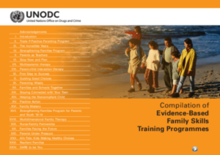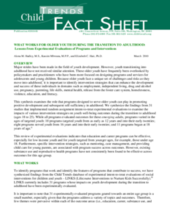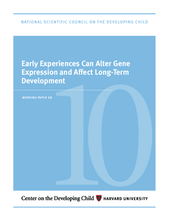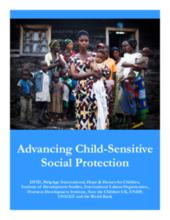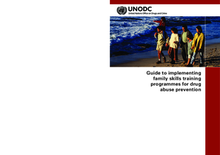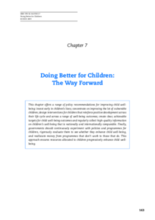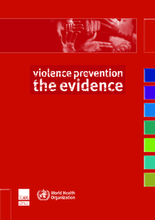Displaying 421 - 430 of 490
This compilation provides policymakers, programme managers, non-governmental organizations and others interested in implementing family skills training programmes with a review of existing evidence-based family skills training programmes. Its purpose is to provide details of the content of such programmes, the groups targeted, the materials used and the training implemented, in order to assist users in selecting the programme best suited to their needs and to offer guidance as to the kind of programmes available.
A new Child Trends fact sheet examines the role that programs for older youth can play in promoting positive development and subsequent self-sufficiency in adulthood.
This in-depth working paper explains how genes and the environment interact, and gives recommendations for ways that caregivers and policymakers can effectively respond to the science.
The study covers all residential child care institutions operating in Armenia, with the purpose of creating a basic baseline for further analysis required for the progressive reduction of placement of children and the development of alternative child care services. The aim of the assessment is to verify the situation of each child in relation to their families, and the respect of their entitlements related to their specific condition.
This paper reports research on outcomes of long term foster care from an eight year longitudinal study of foster care placements in Australia.
Joint statement among UN agencies and NGO partners to build greater consensus on the importance of child-sensitive social protection.
UNODC published Guidelines to implement family skills training programmes for drug abuse prevention in March 2009. These guidelines contain evidence of effectiveness, principles of family skills training programmes, cultural adaptation guidelines, advice on how to recruit and retain families through the programmes, practical advice on training of staff, as well as information about monitoring and evaluating family skills training programmes.
This paper outlines a vision for the network of services, policies, and programmes necessary to protect children at risk and enable them to reach their full potential, free from violence, exploitation, and abuse.
This document is the seventh, and final, chapter of Doing Better for Children: The Way Forward, produced by the Organisation for Economic Co-operation and Development. The aim of this chapter is to contribute to the policy debate on child well-being, synthesising the previous chapters and drawing on the existing research and policy literature.
This report brings together an eight-part series of briefings on the evidence for interventions to prevent interpersonal and self-directed violence. By spotlighting evidence for the effectiveness of interventions, the series provides clear directions for how violence prevention funders, policy makers and programme implementers can boost the impact of their violence prevention efforts.

